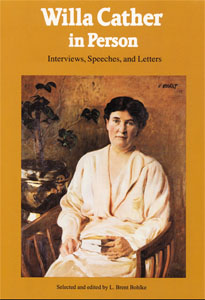from Willa Cather in Person: Interviews, Speeches, and Letters
Selected and edited by L. Brent Bohlke
Lincoln & London: University of Nebraska Press, 1986
1923: PARIS
When Willa Cather was awarded the Pulitzer Prize for One of Ours in 1923, she was only the fourth novelist so honored since the inception of the prizes in 1918. Ernest Poole was the first recipient in 1918, Edith Wharton in 1921, Booth Tarkington in 1919 and 1922, and no award was given in 1920. The awards were announced on 13 May 1923. Cather's citation was "for the American novel published during the year which shall best present the wholesome atmosphere of American life, and the highest standard of American manners and manhood." The cash stipend was $1, 000. Many objected to the award—some because they felt the novel was not good and others because they felt the citation missed much of the point of what Miss Cather was trying to do in the book. The New York Times, however, defended Cather's prize in a spirited editorial on 15 May 1923, saying, "In the first place, One of Ours is admirably written, in English always lucid." That, alone, put it in a class by itself among books of the day. Second, Cather seemed to realize that World War I had some objective, a notion the Times felt that many other authors missed. "She knows as well as any of them that war has 'horrors,' and doubtless she hates it as much as any of them; certainly she does not laud it as among the more commendable of human activities. But she is as little of a pacifist as of a militarist; she is a sane woman who understands that there are worse things than war" (New York Times, 15 May 1923, p. 18, col. 5).
As the interview in the World makes clear, Cather was in France when the awards were announced. Some twelve years later, in 1935, when her good friend Zoë Akins received the Pulitzer Prize in drama for her adaptation of Wharton's The Old Maid, Cather wrote to Zoë, confessing her own true reactions. She told Zoë that to have refused the Pulitzer would have exhibited the poorest taste in the world (she might well have had Sinclair Lewis in mind, since he did just that in 1926). Nevertheless, Cather acknowledged that the Pulitzer was more annoying than it was pleasant. She gave thanks to the Lord that she had been in France at the time hers was announced. Her best advice to Zoë was to avoid becoming flustered by it, and in time she was sure Zoë would be able to laugh about the whole matter (ALS, 10 May 1935, Huntington Library, San Marino, California).
TODAY'S NOVELS GIVE MUCH HOPE TO MISS CATHER
Paris, May 20.—Delighted at the news her novel One of Ours, won the Pulitzer prize, Miss Willa Cather confessed to The World correspondent this afternoon that she is also much surprised, as she had never thought of her book in connection with such an award.
Miss Cather has just started another novel, but she good-humoredly declined to say anything about its nature or setting, declaring:
"I never tell even intimate friends anything whatever about my work until it is finished. I find that if I talk about a novel on which I am at work it has a disturbing influence on me and I lose my grip on the story."
Miss Cather is living with friends, Mr. and Mrs. Jan Hambourg, in the quiet suburb Ville Davray, and expects to remain in Europe a year. Although much better in health, she is still suffering slightly from the effects of her illnesses in New York last winter. Speaking of the literature of today, she told The World correspondent she sees much promise and hope in the new movement in America, despite its little absurdities.
"The new American novel," she explained, "is better than the old-fashioned conventional one, with its plot always the same, its accent always on the same incidents. With its unvarying, carefully dosed ingredients, the old-fashioned American novel was like a chemist's prescription.
"I certainly prefer the modern novelist, even if he does become a little ridiculous when he carries too far the process of chopping up his character on the Freudian psycho-analytical plan. Imagine what Hamlet would have been if Shakespeare had applied Freudian principles to his work.
"So long as a novelist works selfishly for the pleasure of creating character and situation corresponding to his own illusions, ideals and intuitions, he will always produce something worth while and natural. Directly he takes himself too seriously and begins for the alleged benefit of humanity an elaborate dissection of complexes, he evolves a book that is more ridiculous and tiresome than the most conventional cold cream girl novel of yesterday."
Miss Cather was diffident on political matters, but said she is convinced a nation like France, with "wonderful qualities of concentration," is bound to pull through the present crisis. She sees some inconsistency in Parliament, but expresses the opinion "bad Governments come and go without altering the direction of a people's progress. The sanity of people always brings things right."
New York World, 21 May 1923.
